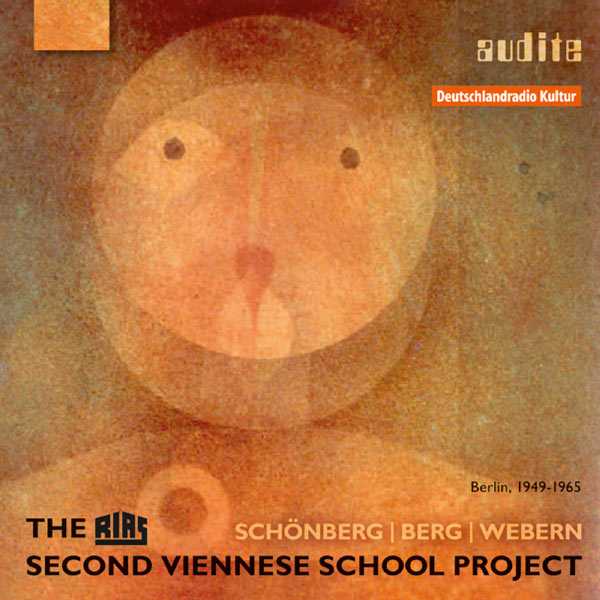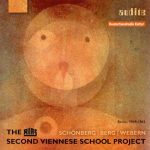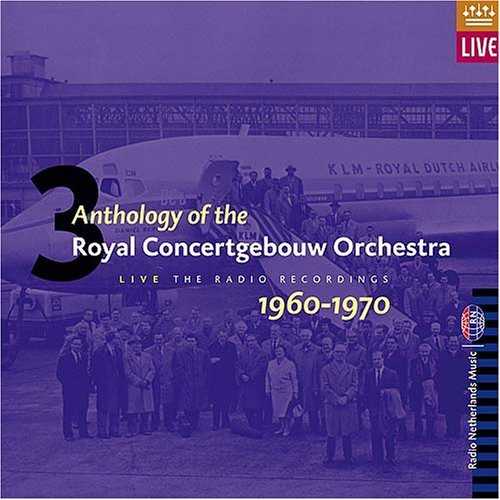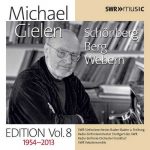
Composer: Alban Berg, Arnold Schoenberg, Johann Strauss, Josef Strauss, Anton Webern
Number of Discs: 4
Format: FLAC (tracks)
Label: Audite
Catalogue: AUDITE21412
Release: 2012
Size: 924 MB
Recovery: +3%
Scan: cover
CD 01
Schoenberg: Pierrot Lunaire, op. 21
01. Part I: No. 1. Moondrunk
02. Part I: No. 2. Columbine
03. Part I: No. 3. The Dandy
04. Part I: No. 4. An Ethereal Washerwoman
05. Part I: No. 5. Chopin Waltz
06. Part I: No. 6. Madonna
07. Part I: No. 7. The Sick Moon
08. Part II: No. 8. Night
09. Part II: No. 9. Prayer to Pierrot
10. Part II: No. 10. Theft
11. Part II: No. 11. Red Mass
12. Part II: No. 12. Gallows Song
13. Part II: No. 13. Beheading
14. Part II: No. 14. The Crosses
15. Part III: No. 15. Homesickness
16. Part III: No. 16. Vulgarity
17. Part III: No. 17. Parody
18. Part III: No. 18. The Moonspot
19. Part III: No. 19. Serenade
20. Part III: No. 20. Homeward Bound
21. Part III: No. 21. O Ancient Fragrance
Schoenberg: Chamber Symphony No. 1, Op. 9
22. Langsam – Sehr rasch
Schoenberg: Piano Concerto, Op. 42
23. I. Andante
24. II. Molto allegro
25. III. Adagio
26. IV. Giocoso: Moderato
CD 02
01. Schoenberg: Phantasy, Op. 47
Schoenberg: Das Buch der hängenden Gärten, Op. 15
02. No. 1. Unterm Schutz von dichten Blattergrunden
03. No. 2. Hain in diesen Paradiesen
04. No. 3. Als Neuling trat ich ein in dein Gehege
05. No. 4. Da meine Lippen reglos sind und brennen
06. No. 5. Saget mir, auf welchem Pfade
07. No. 6. Jedem Werke bin ich furder tot
08. No. 7. Angst und Hoffen wechselnd mich beklemmen
09. No. 8. Wenn ich heut nicht deinen Leib beruhre
10. No. 9. Streng ist uns das Gluck und sprode
11. No. 10. Das schone Beet betracht ich mir im Harren
12. No. 11. Als wir hinter dem bebluhmten Tore
13. No. 12. Wenn sich bei heiliger Ruh in tiefen Matten
14. No. 13. Du lehnest wider eine Silberweide
15. No. 14. Sprich nicht immer von dem Laub
16. No. 15. Wir bevolkerten die abend dustern Lauben
17. Schoenberg: De Profundis (Psalm 130), Op. 50b
Schoenberg: 3 Klavierstucke, Op. 11
18. No. 1. Massig
19. No. 2. Massig
20. No. 3. Bewegt
Schoenberg: 6 Kleine Klavierstücke, Op. 19
21. No. 1. Liecht, zart
22. No. 2. Langsam
23. No. 3. Sehr langsam Viertel
24. No. 4. Rasch, aber leicht
25. No. 5. Etwas rasch
26. No. 6. Sehr langsam
Schoenberg: 5 Klavierstucke, Op. 23
27. No. 1. Sehr langsam
28. No. 2. Sehr rasch
29. No. 3. Langsam
30. No. 4. Schwungvoll
31. No. 5. Walzer
Schoenberg: Klavierstucke, Op. 33a
32. Massig
33. Schoenberg: Klavierstucke, Op. 33b
CD 03
01. Schoenberg: String Trio, Op. 45
Schoenberg: Suite in G major
02. I. Overture
03. II. Adagio
04. IV. Gavotte
Berg: Lyric Suite
05. I. Allegretto gioviale
06. II. Andante amoroso
07. III. Allegro misterioso – Trio estatico
08. IV. Adagio appassionato
09. V. Presto delirando
10. VI. Largo desolato
Berg: 4 Stucke, Op. 5
11. No. 1. Massig
12. No. 2. Sehr langsam
13. No. 3. Sehr rasch
14. No. 4. Langsam
CD 04
Berg: 7 Fruhe Lieder
01. No. 1. Nacht
02. No. 2. Schilflied
03. No. 3. Die Nachtigall
04. No. 4. Traumgekront
05. No. 5. Im Zimmer
06. No. 6. Liebesode
07. No. 7. Sommertage
08. Berg: Schliesse mir die Augen beide (1st setting)
09. Berg: Schliesse mir die Augen beide (2nd setting)
10. Webern: Passacaglia, Op. 1
Webern: 5 Pieces, Op. 10
11. No. 1. Sehr ruhig und zart
12. No. 2. Lebhaft und zart bewegt
13. No. 3. Sehr langsam und ausserst ruhig
14. No. 4. Fliessend, ausserst zart
15. No. 5. Sehr fliessend
Webern: 4 Pièces, op. 7
16. No. 1. Sehr langsam
17. No. 2. Rasch
18. No. 3. Sehr langsam
19. No. 4. Bewegt
20. Strauss Josef: Rosen aus dem Suden, Op. 388 (arr. A. Schoenberg)
Strauss Josef: Der Zigeunerbaron, Op. 417 (arr. A. Webern)
21. Schatzwalzer
22. Schoenberg: Phantasy, Op. 47
This 4-CD boxed set presents historic recordings of works by Arnold Schoenberg, the founding father of 20th-century modern music, and his most prominent pupils, Alban Berg and Anton Webern.
These recordings, made between 1949 and 1965, comprise works which were written between 1906 and 1950, thus portraying practically the entire era of the Viennese School. Not only do they trace the multi-layered compositional developments of the Viennese School, but they are also significant musical and historic documents of multi-faceted interpretational approaches towards this music.
The Viennese School was formed before the First World War as a movement in music attempting to unite radical expressive techniques and traditional form concepts, demanding specially trained interpreters for this undertaking. In these RIAS recordings, first-rate artists from the circle of the three Viennese composers can be heard: Rudolf Kolisch, Eduard Steuermann, Winfried Zillig and Else C. Kraus were immediately shaped by their teacher, Schoenberg, whereas others, such as Peter Stadlen and Tibor Varga were in contact with the composer, or with Webern or Berg. Ferenc Fricsay or Suzanne Danco, on the other hand, did not belong to the circle of the Viennese School and its performance teachings. Their interpretations are of particular interest as they brought these works to life, unprejudiced by performance traditions of this music which, at that time, was hardly performed.
The comparison of the two recordings of Schoenberg’s ‘Fantasy for Violin and Piano’, Op. 47, with Kolisch and Varga respectively, and the sensational interpretation of Schoenberg’s ‘Pierrot Lunaire’ by the Munich singer Irmen Burmester alongside an outstanding instrumental ensemble under the direction of Josef Rufer (1949) are particular highlights of this anthology.
These radio recordings were made possible thanks to the indefatigable initiative of the music writer Hans Heinz Stuckenschmidt in his role as Editor of New Music at the RIAS. He and his colleague Josef Rufer, who can be heard as conductor, ensured that those musicians who had returned from exile would be engaged to contribute to these radio documents. By doing so, Stuckenschmidt and Rufer intended, on the one hand, to continue the tradition of Schoenberg’s stay in Berlin from 1925 until 1933, and, on the other hand, to provide the music of the Viennese School with greater resonance within public awareness.
This edition is complemented by the publication of a text by Prof Dr Rudolf Stephan, the doyen of research into the Viennese School in Germany after the Second World War and editor of the complete works of Arnold Schoenberg and Alban Berg. He reflects on his comprehensive experiences with the music of the Viennese School, stretching back to the years immediately following the end of the war.



